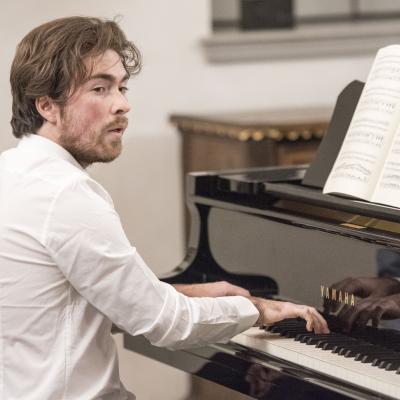Program
The piano lessons begin with the discovery of the instrument and its multiple possibilities of sound and musical expression, through the repertoire and improvisation. Then comes the development of the student's musicality and the acquisition of the instrumental basics, which will be, in a later phase, deepened to finally develop the student's autonomy and personality.
The Apolline School of the Arts' beginner piano program is designed for anyone who wants to learn to play the piano and understand music theory. Our method is based on key concepts such as rhythmic solfeggio, keyboard knowledge, hand independence, phrasing/nuances piano technique and harmonic knowledge to help students develop a complete understanding of music. For children, we use a playful and interactive approach to make learning fun and engaging. Accompanied by our teacher, a graduate of the Lausanne Conservatory, students receive quality instruction and are encouraged to develop their own style and artistic sensibility while acquiring solid technical skills.
Our classes are also adapted for advanced pianists who wish to deepen their technique and knowledge. At Apolline, our mission is to help students achieve their goals, whatever their level. If you like jazz, we will focus on improvisation and harmonic knowledge related to the style. If you are more of a classical student, we will focus on score reading and related piano techniques. In short, there is something for everyone!
Objectives and skills
- Adaptation of the body to the instrument - development of a natural piano posture
- Coordination of gestures, position and independence of the hands.
- Listening development - learning to listen to one's own game and that of others
- Development of the sense of rhythm - simple rhythm on a pulse at the beginning, towards a refinement of precision
- Musical phrasing and breathing
- Playing in public
- Musical expression, improvisation
- Sight reading (music theory)
Concerning this last point, it is important to specify that in Apolline's case, music theory is integrated into the instrument course, sparingly and in a manner consistent with the subject studied by the child. Thus, theory sticks to practice and becomes digestible and interesting. To learn more about this subject, see our article on music theory lessons.
Learning music with Apolline
How do you get out of the usually rigid framework of the early years of musical learning found in most schools in Switzerland?
Based in Lausanne, Apolline has a different philosophy. Rather than offering children and teenagers the opportunity to learn in individual lessons, the emphasis is on small group lessons - of 2 or even 3 students, depending on the instrument. This group work will encourage listening, playing with others, improvisation, as well as a sense of musical sharing. The students will progress technically, while having the pleasure of playing music. The extra motivation generated by learning and progressing together is an important driving force.
The groups are always formed according to the age and level of competence of the students, in order to allow a coherent exchange and dynamic progression. For more information, see our article on private VS semi-private music lessons.
Apolline offers its students the possibility of integrating a music band workshop, in addition to the basic instrument course, to allow them to play with other musicians of their own age. Accompanied by a teacher, they will learn to play in a group, through covers or their own compositions.
Teachers
Prices
| Cours | Duration | Monthly price* | One price** |
|---|---|---|---|
| Children and adolescents (under 18): | |||
| Semi-Private - 2 students | 40 minutes | 111.00 CHF | 1'250.00 CHF |
| Children and adolescents (under 18): | |||
| Privé | 30 minutes | 149.00 CHF | 1'690.00 CHF |
| Privé | 40 minutes | 166.00 CHF | 1'890.00 CHF |
| Privé | 50 minutes | 179.00 CHF | 2'090.00 CHF |
| Adults (from 18 years old): | |||
| Privé | 30 minutes | 166.00 CHF | 1'890.00 CHF |
| Privé | 40 minutes | 175.00 CHF | 1'990.00 CHF |
| Privé | 50 minutes | 189.00 CHF | 2'190.00 CHF |
* 12 monthly payments from September to August (voir notre règlement).
** Price for the payment of the whole year's courses in one payment.
Prices are valid for annual registration (courses from September to June). All fees are included in the prices listed. Registration during the year is possible (prorated according to the number of remaining courses)

